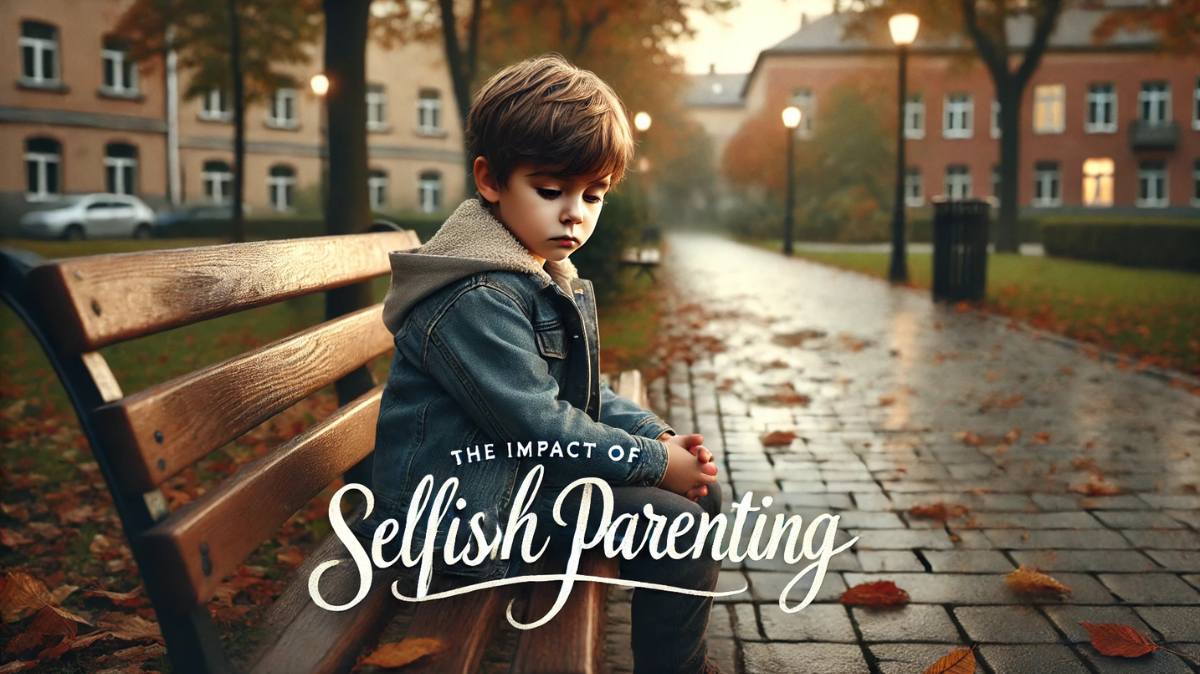Parenting is a journey filled with sacrifices, love, and selflessness—at least, it should be. However, sometimes we encounter parents who put their own needs above everything else, even at the cost of their children’s well-being. This article explores 75 unique selfish parents quotes, each with a little bit of wisdom, humor, and insight to help you see the reality behind such behaviors. Whether you’re looking for validation or understanding, these quotes will resonate deeply.
Quotes About Selfish Parenting Behavior
1. “A selfish parent brings a child into the world, not for the child’s happiness, but to satisfy their own ego.”
Often, children become an extension of a parent’s desire to be admired, rather than individuals to be nurtured.
2. “If a parent only loves their child for making them look good, that isn’t love—it’s vanity.”
Love should be unconditional, not tied to how a child boosts a parent’s image.
3. “Selfish parents are those who give their children only what benefits themselves.”
Parenting should be selfless, not driven by what’s convenient for the parent.
4. “A child should never have to earn a parent’s love; that’s a debt no child can repay.”
True love is freely given, not exchanged for achievements or good behavior.
5. “If you’re always putting yourself first, don’t expect your child to think of you as anything but selfish.”
Children notice more than we think—they see when love is conditional.
When Parenting Feels One-Sided
6. “It’s not parenting if it’s always ‘me first.’”
Being a parent means often putting yourself last, not seeking constant self-gratification.
7. “A parent’s world should expand to fit their child, not squeeze them out.”
Children should feel included, not pushed aside to make room for a parent’s wants.
8. “A selfish parent will have children that learn to live without them.”
When parents are absent—physically or emotionally—children learn to adapt, often by becoming distant themselves.
9. “Children shouldn’t have to chase their parent’s attention; it should be freely given.”
If a child is constantly seeking validation, it’s a sign something’s amiss.
10. “The greatest gift a parent can give is time, not things.”
Material gifts can’t replace the value of undivided attention and care.
The Impact of Selfish Parents on Kids
11. “When a parent takes more than they give, they leave a child feeling empty.”
Emotional nourishment is vital, and when it’s absent, the effects are profound.
12. “Children of selfish parents learn to fend for themselves too early.”
Kids should be kids—not miniature adults responsible for their own survival.
13. “The wounds of a selfish parent run deep, leaving scars that last a lifetime.”
Neglect or selfishness in parenting leaves emotional marks that often don’t heal easily.
14. “Parents who put their needs first raise children who struggle to find their own voice.”
Dominating behavior can lead children to suppress their own thoughts and desires.
15. “It’s easy to make excuses for selfishness, but it’s harder to live with the consequences.”
Parents may rationalize their behavior, but the impact on children can’t be ignored.
For further reading on the effects of parenting styles on child development, you can visit this article by Psychology Today, which provides in-depth information on different approaches to parenting and their impact on children.
The Emotional Toll of Growing Up With Selfish Parents
16. “A child should feel safe in their parent’s love, not suffocated by their expectations.”
Healthy love is a safe harbor, not a storm of demands.
17. “Growing up with a selfish parent is like walking on a tightrope—you never know when you’ll fall.”
Unpredictability in a parent’s affection creates insecurity in children.
18. “Selfish parents take all the oxygen out of the room, leaving their kids gasping.”
Emotional space is important. If a parent dominates, there’s little room left for the child to breathe.
19. “Kids shouldn’t have to compete with their parent’s ego.”
Parenting is about nurturing the child’s self-esteem, not inflating your own.
20. “Sometimes, the most dangerous place for a child is at home, with a parent who only cares for themselves.”
A harsh truth, but an important one. Safety isn’t just physical—it’s emotional, too.
Selfish Parents and Unfulfilled Promises
21. “A selfish parent promises the world but delivers an empty map.”
Unfulfilled promises lead to disillusionment and mistrust.
22. “Actions speak louder than words, especially when a parent’s actions say, ‘I come first.’”
Words without follow-through mean little, especially to a child who just wants to feel loved.
23. “Selfish parents give the gift of excuses.”
Instead of accountability, children receive a catalog of reasons why their needs aren’t met.
24. “The difference between a loving parent and a selfish one is the ability to listen.”
Listening is a simple, powerful act, often overlooked by those who are too focused on themselves.
25. “Promises should be kept, not used as tools for manipulation.”
Using promises to control or manipulate creates a toxic environment for children.
Recognizing Selfish Behavior in Parents
26. “A selfish parent wants loyalty without giving respect.”
Respect is earned, not demanded, and children feel this deeply.
27. “Parenting isn’t about winning; it’s about growing.”
Growth is mutual; if only one side benefits, it’s not true parenting.
28. “If a parent’s love feels like a transaction, it’s not love—it’s business.”
Love doesn’t come with conditions or price tags.
29. “The louder a parent’s demands, the quieter a child’s spirit.”
Overbearing expectations can stifle a child’s natural enthusiasm and joy.
30. “Love should liberate, not bind.”
Children should feel free, not shackled by the weight of a parent’s expectations.
The Emotional Distance of Selfish Parents
31. “When a parent is too busy to care, a child learns to stop expecting.”
Constant neglect teaches children to bury their needs and emotions.
32. “A selfish parent may live for themselves, but they make their child pay the price.”
Every self-centered action leaves a lasting impact on a child’s emotional well-being.
33. “If love is conditional, it’s not love—it’s a bargain.”
Children need to feel loved for who they are, not for how well they meet their parent’s conditions.
34. “The heart of a child is like clay; selfishness can harden it into stone.”
Children’s hearts are vulnerable, and selfishness can cause them to close off.
35. “A parent’s indifference is louder than words.”
Kids can sense neglect, even if it’s unspoken, and it affects them deeply.
Control and Manipulation in Selfish Parenting
36. “Selfish parents don’t want what’s best for their kids; they want what’s best for themselves.”
True love seeks the child’s happiness, not the parent’s agenda.
37. “Manipulation wrapped in love is still manipulation.”
It’s not love if it’s used to control; it’s a tactic to bend others to their will.
38. “A selfish parent gives just enough to keep their child dependent, never enough to help them grow.”
Keeping children close isn’t always about love; sometimes it’s about control.
39. “Saying ‘I love you’ isn’t enough if your actions don’t match your words.”
Children need consistent love, not empty affirmations.
40. “Control isn’t care; it’s just a way to make sure everything goes your way.”
Controlling behavior often masquerades as care but leaves little room for a child’s autonomy.
The Unseen Burden of Selfishness on Kids
41. “A child’s shoulders shouldn’t bear the weight of a parent’s unfulfilled dreams.”
Kids shouldn’t have to live out what their parents couldn’t achieve.
42. “When parents are selfish, children learn to be self-sufficient before they’re ready.”
They are forced to grow up too fast, missing out on the joy of childhood.
43. “Children should be taught how to love, not how to survive.”
Survival mode isn’t a childhood—it’s a coping mechanism.
44. “A selfish parent’s love is like a loan; it comes with interest and strings attached.”
Conditional love can make children feel like they’re always indebted.
45. “Some parents love themselves more than they ever love their children, and it shows.”
Children see through the façade when there’s a lack of genuine affection.
The Cycle of Selfish Parenting
46. “The apple doesn’t fall far from the tree, but it doesn’t have to rot there.”
Children of selfish parents can choose to break the cycle and create a healthier future.
47. “It’s not about perfection; it’s about trying to be better than you were yesterday.”
Even selfish parents can change if they’re willing to acknowledge and improve their behavior.
48. “Children don’t expect perfect parents, just present ones.”
Showing up matters more than having all the answers.
49. “If a parent can’t see past their own nose, they’ll miss everything their child truly needs.”
Self-absorption blinds parents to their child’s emotional cues.
50. “Breaking free from a selfish parent’s grasp is like learning to breathe on your own.”
It’s difficult but necessary for personal growth and emotional health.
How Selfish Parenting Affects Future Relationships
51. “The way a parent treats their child teaches them how to expect love from others.”
Selfishness from parents often leads to struggles in forming healthy adult relationships.
52. “A parent’s lack of empathy creates a ripple effect in a child’s life.”
Children who aren’t shown empathy may struggle to offer it to others.
53. “Kids shouldn’t have to earn love, and adults shouldn’t have to unlearn that lesson.”
Early experiences of conditional love can create lifelong patterns.
54. “A child raised by selfish parents may feel like they’re constantly trying to please everyone.”
They become people-pleasers, always seeking approval that was denied to them as children.
55. “The damage of selfish parenting doesn’t end in childhood; it echoes through adulthood.”
The wounds may heal, but the scars remain as reminders.
Exploring Life With a Selfish Parent
56. “Surviving a selfish parent doesn’t make you weak; it makes you strong.”
Enduring difficult situations builds resilience, though it may come at a cost.
57. “When a parent is a taker, the child learns to give until they have nothing left.”
Boundaries are crucial, and learning to set them is a vital part of healing.
58. “It’s okay to distance yourself from a parent who puts themselves first.”
Boundaries are not about cutting ties; they’re about protecting yourself.
59. “Sometimes, the most loving thing you can do is walk away.”
Leaving behind toxic behavior, even from a parent, is sometimes necessary for self-care.
60. “Healing means learning to love yourself, even when your parent couldn’t.”
Self-love is the antidote to the emptiness left by selfish parenting.
Overcoming the Hurt of Selfish Parenting
61. “The past doesn’t define you, but it can guide you to a better future.”
Recognizing the impact of selfish parenting can inspire positive change.
62. “Healing from selfish parenting is like piecing together a puzzle you never knew was broken.”
It’s a gradual process, but every step brings you closer to wholeness.
63. “Your worth isn’t defined by a parent’s failure to see it.”
You are more than how your parent treated you.
64. “Forgiveness isn’t about them; it’s about freeing yourself.”
Letting go of resentment can be an act of self-liberation.
65. “It’s okay to grieve the parent you never had.”
Acknowledging the loss of what could have been is a step towards healing.
Reclaiming Self-Worth After Growing Up With Selfish Parents
66. “A parent’s failure to love doesn’t mean you’re unlovable.”
The issue lies with them, not you.
67. “Sometimes, you have to be your own biggest cheerleader.”
If your parent didn’t lift you up, learn to lift yourself.
68. “Healing is not linear; it’s okay to stumble on your journey.”
There will be setbacks, but they don’t mean you’re failing.
69. “Don’t let a selfish parent’s behavior make you selfish, too.”
Breaking the cycle means choosing empathy and understanding.
70. “You deserve the love you were denied.”
Self-worth isn’t defined by a parent’s inability to give it.
Learning to Let Go
71. “Letting go of a selfish parent doesn’t mean you’re giving up; it means you’re choosing yourself.”
Self-preservation is vital when facing persistent toxicity.
72. “Growth comes from nurturing, not from deprivation.”
Seek out positive influences who lift you up, not drag you down.
73. “It’s okay to say ‘no’ to a parent’s demands.”
You have the right to your own boundaries and autonomy.
74. “Loving someone from a distance is still love.”
Sometimes, distance is necessary to preserve your peace of mind.
75. “Choosing to be different from your parent is a form of love—for yourself and for others.”
You can redefine what love means by choosing to act with compassion and selflessness.
Final Thoughts
Selfish parenting can leave deep emotional scars, but recognizing these behaviors and their impacts is the first step toward healing. Whether you’re trying to understand a selfish parent or reflecting on your own habits, awareness can lead to growth. The journey might be tough, but remember—you are worthy of love, compassion, and understanding. Every step you take towards breaking the cycle of selfishness paves the way for a brighter, more loving future.
To explore more insights on family dynamics, check out these fake family quotes for a deeper understanding of how complex relationships can affect us.
FAQs About Selfish Parenting
Q1: How can I deal with a selfish parent? Dealing with a selfish parent can be challenging, but setting healthy boundaries is crucial. Communicate your feelings honestly and seek support from trusted friends, family members, or a therapist.
Q2: What are the signs of selfish parenting? Some common signs include prioritizing their own needs over their child’s, failing to listen or validate their child’s feelings, and placing high demands without reciprocation.
Q3: Can a selfish parent change? Yes, change is possible, but it requires self-awareness and a willingness to grow. Open communication and therapy can help, but change must come from within.
Q4: How does selfish parenting affect children long-term? Children who grow up with selfish parents may struggle with self-esteem, relationship issues, and trust. These effects can last well into adulthood.
Q5: What is the difference between strict and selfish parenting? Strict parents enforce rules out of love and care for their child’s well-being, while selfish parents enforce rules mainly to suit their own needs or to control their children.
Q6: How can I avoid being a selfish parent myself? Focus on listening, putting your child’s needs first, and being open to compromise. Reflect on your actions and make adjustments to ensure your child feels valued and loved.
Author

Chuck Orwell writes short, practical commentary for Quote of the Day and What Is Your Purpose, focusing on clear lessons from Einstein, classical sources, and contemporary thinkers. Each quote is checked against the earliest reliable citation when available, and disputed attributions are labeled as such. Entries are reviewed and updated for accuracy over time.
Editorial approach: concise context, source-first citations, and plain-language takeaways.
View all posts
Contact / corrections: Connect on LinkedIn or use the site’s contact page.


